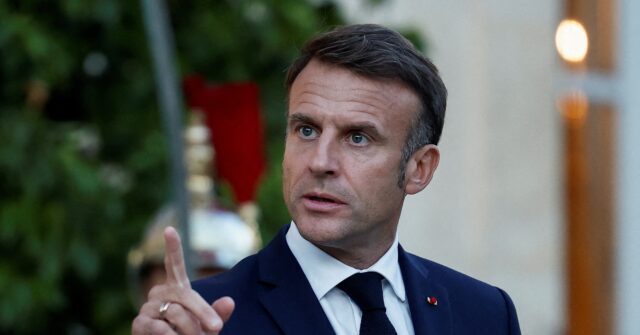French President Emmanuel Macron recently advocated for an embargo on Western arms to Israel amid its ongoing conflict with Hamas in Gaza, particularly in light of the one-year anniversary of the terrorist group’s massacre of over 1,200 individuals in southern Israel. Macron’s remarks came during a speech where he confirmed that France had halted its arms supply to Israel intended for use in Gaza. He emphasized that political solutions must take precedence over military action, underscoring the need to cease any arms deliveries that could exacerbate the crisis in the region.
Macron’s position contrasts sharply with his staunch support for the war in Ukraine, where he has even suggested the possibility of deploying Western troops to assist Ukraine in its struggle against Russian aggression. This duality in Macron’s foreign policy approach is evident as he recently called for a ceasefire in Lebanon, where Israeli operations target both Hamas and Hezbollah, the Iranian-aligned militia. His emphasis on diplomacy in the Israeli-Palestinian conflict further highlights his desire to navigate a complex geopolitical landscape while responding to mounting tensions.
The French president’s position is resonating with recent policy shifts in other European countries. Following the escalation of hostilities, the UK’s left-wing Labour government suspended numerous arms contracts with Israel. UK Foreign Secretary David Lammy confirmed the suspension of about 30 arms export licenses, which encompass UK-made components for various military aircraft and drones deployed by the Israeli military. This decision appears to stem from concerns over potential human rights violations in Gaza, indicating a broader trend of reconsideration among Western allies regarding their military support to Israel.
Domestically, both France and the UK have witnessed significant public pressure from leftist groups and Muslim activists over the ongoing conflict, leading to widespread protests across major cities. Since the tragic events of October 7, public demonstrations advocating for an end to violence in Gaza and Lebanon have intensified in cities such as London, Paris, Athens, Brussels, and Rome. These protests reflect growing calls for accountability and a reassessment of military ties to nations engaged in contentious conflicts.
Moreover, Macron’s comments arose amidst escalating hostilities, including Israel’s reported plans for retaliatory actions against Iran following missile attacks from the Islamic Republic. This situation underscores the interconnected nature of the region’s conflicts and further complicates diplomatic efforts within Europe. As Israel resorts to military measures in retaliation, the implications for Western foreign policy principles and arms supply dynamics are becoming increasingly critical.
Ultimately, Macron’s call for a halt to arms supplies to Israel signifies a potential shift in European foreign policy, driven by humanitarian concerns and the growing influence of public sentiment against military engagement. The tensions between military support and calls for peaceful negotiations highlight the multifaceted challenges that Europe faces in dealing with the Israeli-Palestinian conflict and the broader regional stability in the Middle East.

